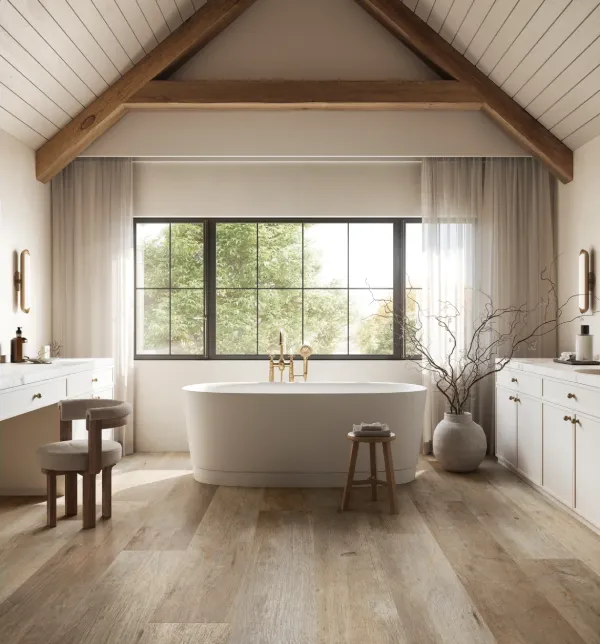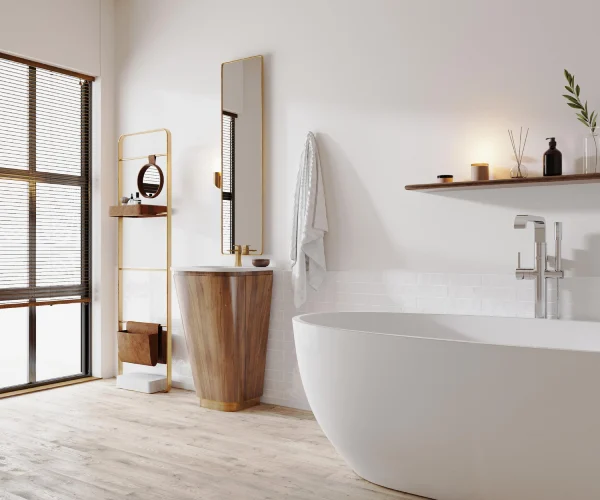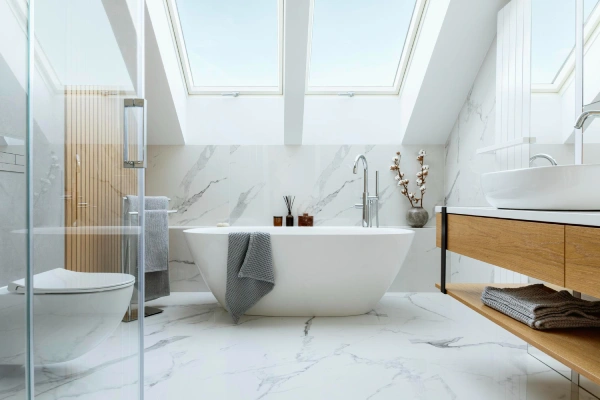
1. Always select durable materials for your bathroom renovation
The choice of materials in your bathroom renovation is foundational to its longevity. High-traffic and moisture-rich environments demand materials that can withstand constant use and exposure to water.

Porcelain tiles for flooring and walls are celebrated for their durability and water resistance. Similarly, quartz countertops, while on the pricier side, offer a resilient and non-porous option for vanities. Opting for solid brass fixtures can also ensure your taps and showerheads resist wear and corrosion over time.
Using cheaper materials can save money but they won’t last for very long in your home. Investing in quality materials from the outset may have a higher initial cost but can save you money and hassle in the long run by reducing the need for frequent replacements and repairs.
2. Make time for regular bathroom maintenance & cleaning
The longevity of a new bathroom renovation significantly depends on regular maintenance and cleaning once the job is complete. Establishing a good bathroom cleaning routine to follow can help you plan out priorities for daily bathroom cleaning, weekly cleaning, and deep cleaning.

Simple habits can make a considerable difference, such as using gentle, non-abrasive cleaners to avoid damaging surfaces and fixtures. Regularly checking and addressing drips and leaks not only saves water but also prevents the deterioration of your bathroom components. Keeping grout clean and in good condition is crucial to prevent water infiltration behind tiles, which can lead to mould growth.
From your tiles to your taps, regularly cleaning your bathroom not only keeps your space looking fresh and clean but also ensures the longevity of a range of bathroom features.
3. Why proper ventilation is key for bathroom longevity
A brand-new bathroom renovation won’t look new for long if there isn’t proper ventilation for the space. Ideally, having windows in a bathroom is great to help airflow in the room and prevent condensation. Without windows, it’s important to ensure that bathrooms have adequate fans to dry out damp bathrooms after baths and showers.
Adequate ventilation is crucial in preventing mould and mildew, which can compromise the structural integrity of your bathroom and pose health risks. Regular cleaning and maintenance of an extractor fan is also vital to ensure it operates effectively and does the job.
Consider integrating a humidity-sensitive switch that activates the fan automatically, maintaining optimal humidity levels and further safeguarding your brand-new bathroom renovation against moisture damage.
4. Keep an eye on your bathroom sealant to prevent water damage
Water damage can be a homeowner’s nightmare and can lead to costly repairs and renovations. In a new bathroom renovation, it is important to ensure that all bathroom fixtures are properly sealed to help protect the bathroom.
Quality silicone sealant around baths, showers, and sinks prevents water from seeping into walls and floors but it also needs to be maintained over time. It’s essential to check and replace these seals regularly as part of your bathroom maintenance routine to prevent water damage and ensure your quality bathroom lasts a long time. Replacing and reapplying sealant when needed is an easy bathroom DIY job if you know how to do it properly.
Properly installed and maintained waterproof membranes in shower areas also play a crucial role in preventing leaks and water damage, ensuring the longevity of your bathroom’s structure. Checking them regularly can ensure that you spot problems early on to prevent any damage to your bathroom.
